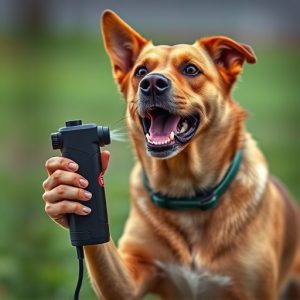Understanding Dog Aggression & Alternatives to Pepper Spray Deterrents
Dog aggression, driven by fear or past trauma, often responds to perceived threats in personal space…….
Dog aggression, driven by fear or past trauma, often responds to perceived threats in personal space as self-defense. While pepper spray is marketed for dog attacks, its effectiveness is questionable due to dogs' strong sense of smell and varying sensory processing. Modern pepper spray formulations leveraging capsaicin, citric acid, and natural anti-inflammatory extracts may deter aggression by causing temporary blindness and respiratory distress. However, its use should be part of a broader strategy including proper training, socialization, clear boundaries in public spaces, leashing in unknown areas, and professional help for underlying issues, ensuring comprehensive protection against aggressive dogs.
“Discover effective strategies to prevent dog attacks, including an in-depth look at pepper spray as a deterrent. While popular, understanding why pepper spray might not be the universal solution for aggressive dogs is crucial. Explore the science behind its formulations and learn alternative approaches tailored to canine behavior.
From recognizing aggression triggers to implementing safe, proven tactics, this guide offers insights into preventing dog attacks without relying solely on pepper spray. Enhance your knowledge and stay protected.”
- Understanding Dog Aggression and Why Pepper Spray Might Not Be the Solution
- The Science Behind Pepper Spray Formulations for Dog Deterrence
- Effective Strategies and Alternatives to Consider for Dog Attack Prevention
Understanding Dog Aggression and Why Pepper Spray Might Not Be the Solution
Dog aggression is a complex behavior that arises from various factors, including fear, territorial instincts, or past trauma. When a dog feels threatened or its personal space is invaded, it may react with aggression as a means of self-defense. Simply putting, dogs use aggression to communicate their discomfort and deter potential threats.
While pepper spray is often marketed as a solution for stopping dog attacks due to its formulation against aggressive dogs, it’s crucial to understand its limitations. Pepper spray stimulates the olfactory system, causing tears, pain, and temporary blindness in humans. However, dogs have an incredibly strong sense of smell, but they process sensory information differently than humans. Therefore, the effectiveness of pepper spray on deterring dog aggression is questionable. Moreover, using pepper spray may escalate the situation by triggering the dog’s protective instincts, leading to more severe attacks or causing harm to the person applying it.
The Science Behind Pepper Spray Formulations for Dog Deterrence
The effectiveness of pepper spray as a deterrent against aggressive dogs relies on its unique formulation and active ingredients. These sprays are designed to target specific sensory systems in dogs, temporarily impairing their ability to perceive threats accurately. The primary ingredient often used is capsaicin, the compound responsible for the heat sensation in chili peppers. When inhaled by a dog, capsaicin binds to nerve endings in the nasal cavity, causing irritation and a strong inflammatory response. This results in temporary blindness, coughing, sneezing, and difficulty breathing, prompting the dog to retreat or become less aggressive.
Modern pepper spray formulations for dog deterrence go beyond pure capsaicin. They incorporate various other agents like citric acid, which enhances the sensory effect, and natural plant extracts known for their anti-inflammatory properties. These added components not only increase the spray’s potency but also reduce potential side effects on humans who may come in contact with it accidentally. The science behind these formulations ensures that the spray is safe for human use while effectively deterring dogs from aggressive behavior.
Effective Strategies and Alternatives to Consider for Dog Attack Prevention
Preventing dog attacks is a multifaceted approach that goes beyond just carrying pepper spray. While pepper spray formulation designed for aggressive dogs can be an effective deterrent, it’s crucial to consider a range of strategies for comprehensive protection.
Beyond Pepper Spray Formulation Against Aggressive Dogs, there are numerous alternatives and techniques worth exploring. Training your dog properly, ensuring proper socialization, and establishing clear boundaries in public spaces can significantly reduce the likelihood of an attack. Additionally, keeping your dog leashed in unknown or potentially triggering environments offers a layer of safety. Regularly evaluating your pet’s behavior and seeking professional help when needed is also essential to address any underlying issues that might contribute to aggression.
While pepper spray formulations for dog deterrence have gained attention as a quick solution to prevent attacks, understanding the underlying factors of dog aggression and exploring alternative strategies is crucial. In light of this, it’s evident that a multi-faceted approach combining behavioral modifications, training, and safe, humane deterrents is far more effective in managing and preventing aggressive behavior in dogs. Remember that, when considering any method to deter an aggressive dog, the safety and well-being of both the animal and humans involved should always be the top priority.


